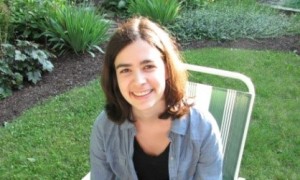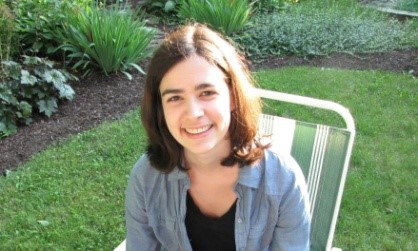Dismantling the Religious/Secular Binary – Caroline Barnett
 While there is a multitude of things the church needs to work on to become aligned with who Christ calls us to be, there is one issue that sticks out in my mind: the growing gap between religious and secular culture. As Owen pointed out, the church is rapidly losing its place of privilege in American culture and the mistrust of the institution continues to rise as unfortunate stories of hypocrisy and intolerance come to surface. And so a gap has emerged. On one side there are Christians who fear irrelevance and powerlessness when it comes to societal issues such as poverty, racism, and discrimination, to name a few. And then across the gap there are those who are not of any religious tradition: atheists, agnostics, humanists, “nones,” those who relate to religion culturally but not spiritually (friends who refer to themselves as “cultural Catholics” akin to “cultural Jews”). Many see the church as hypocritical, and perpetuating the systems of oppression that exist today. I can’t say either side is wrong.
While there is a multitude of things the church needs to work on to become aligned with who Christ calls us to be, there is one issue that sticks out in my mind: the growing gap between religious and secular culture. As Owen pointed out, the church is rapidly losing its place of privilege in American culture and the mistrust of the institution continues to rise as unfortunate stories of hypocrisy and intolerance come to surface. And so a gap has emerged. On one side there are Christians who fear irrelevance and powerlessness when it comes to societal issues such as poverty, racism, and discrimination, to name a few. And then across the gap there are those who are not of any religious tradition: atheists, agnostics, humanists, “nones,” those who relate to religion culturally but not spiritually (friends who refer to themselves as “cultural Catholics” akin to “cultural Jews”). Many see the church as hypocritical, and perpetuating the systems of oppression that exist today. I can’t say either side is wrong.
But as this gap widens and we forget we belong to one another, a sort of war emerges. Religion versus secular. It crops up everywhere: in classrooms, on the internet, in politics, in everyday interactions. It tinges the relationships between people of faith and secular. There is a bitterness when these conversations emerge, almost as if there is a disconnect between people. And this religious/secular binary is a dangerous mentality to hold. Suddenly there is a set of ideals Christians have and another reserved for secular people. They are separate and cannot bleed into each other.
In 2008, I found myself in an airport on Palm Sunday returning home from a spring break vacation with my cousins. As we waited during a layover, I stood in a busy terminal while my family stopped in a bookstore. Twenty feet away from me was a man, dressed in a suit and tie, standing alone. We made eye-contact and I smiled politely as he walked towards me. He introduced himself as David, asked me a bit about myself, and very quickly steered the conversation toward whether or not I had accepted Jesus Christ as my Lord and Savior. I tripped over my words in attempting to explain how I viewed Christ and how I knew God loves me as God loves everyone. However my answer, as inarticulate as any fourteen-year-old-asked-to-defend-their-faith can be, was unsatisfactory to David and he continued to push me on how I could possibly know where I was going to spend my eternal life if I hadn’t had the exact same spiritual experience as he.
Whether or not one agrees with David’s words and the theology behind approaching strangers in the airport, we can learn from this exchange. While in some ways I’m sure I use similar language as David to describe my faith, he seemed stuck in a way of thinking that didn’t allow for any creativity of expression. We are blessed to have imagination and freedom when it comes to how we describe ourselves. As David tried to constrain my voice, I grew frustrated: frustrated that a man who said he loved Jesus could not see the beauty of diverse answers, nor the possibility of a unique conversation that might have occurred. For David, it was Christian or not, he was right and I was wrong, and there was no in-between.
This way of thinking is problematic for two reasons. First, we have seen the inherent problems with binaries. The gay/straight, male/female binary is no longer appropriate for describing our gender identity and sexuality because it leaves out a range of experiences and feelings that we, as children of God, can have. Similarly a religious/secular binary excludes any sort of faith and spirituality that is not in line with very specific ways of looking at religion. To cut off these experiences and to silence the voices of those who do not fall within a group is oppositional to message of Christ in which everyone has a seat, and a voice, at the table. We must be diligent to make sure our language and labels are inclusive towards all.
Secondly, the growing division between religious and secular culture is problematic because we are missing out on chances to grow and change as we interact, and form relationships with those who are different from us. Similar to interfaith work, crossing the divide lends itself to not only new insights, but authentic and meaningful interactions that bolster our own faith in God. The societal issues we worry about- injustice, racism, sexism, heterosexism, violence- are the same things secular people worry about. But by making them Others, and calling them the enemy, we are losing precious chances to work together and affect real change in this broken world. We are stronger together than apart.
This doesn’t mean that we have to agree on everything. In fact, it means we won’t. But through our differences our own faith can be bolstered and our love for one another can grow. More so than any other generation, my cohorts and I are exposed to a diverse array of opinions, religions, spiritualities, and I praise God every day for that. My close friends hold spiritual beliefs that are a little foreign to me at times, just as I’m sure my own belief in an incarnate God is mystifying to them. But through it all, our relationships are strengthened by our differences rather than fractured. And together we work for and care about the same issues of justice and peace in this world.
And so, the binary of religious/secular is one we must dismantle as it keeps us apart from those we need. Dialogue based on binaries becomes filled with hateful words that threaten our relationships. Through our words the other side is dehumanized and the “war” rages on. And I cannot inhabit a mentality that forces me to think of secular culture, and therefore secular people, as people I have nothing in common with, and nothing to learn from.
I have hope that one day these words that have turned into swords will be beaten into plowshares. However, it might not happen. As the church’s position in society continues to shift, change, and possibly diminish, we must remember these changes are not always bad, and that those who are not with us are certainly not against us. The church of 2064 will in many ways be unrecognizable to our present selves, but I believe we have a choice. There will be changes, for better and for worse. It will be easy to retreat into our fear of the unknown, and hold onto the ways we used to do things. It is certainly easier to do what we have always done. But we can evolve with these changes, learn from one another, and find our way. We can rely on not only other Christians but those of different faiths, and those of no faith for inspiration, as well as partnership in action when working to bring about a more just world. It will be hard, but for the sake of the future church we must shift our ways of thinking to embrace new ideas and creative approaches to living out God’s call for all of us. And together we can build a church of 2064 that is filled with the love, grace, and justice we all know it can hold.
Response Owen Gray
I think that another dangerous binary- us/them- must be watched, because just as the religious might be secularists with suspicion, so too might mainliners view evangelicals suspiciously, or liberal Presbyterians view conservative Presbyterians with apprehension. What tools of sympathy and empathy can we utilize to better be Christ to our brothers and sisters with whom we disagree?
Response Jessie Light
Instead of letting differences in belief divide us from our ecumenical partners and the secular world, I stand firmly behind the call to dialogue and be in conversation with those who disagree, so that we might learn and grow in our own responses to God’s love. How can the PC(USA), which is reformed and always reforming, live into our denominational identity in new ways by engaging in conversation with those who profess no faith?
Response Geoff Wehmeyer
I loved Caroline’s insight that “those who are not with us are certainly not against us”: a poignant reminder to me that those who speak out against the institution of the church speak from sincere beliefs and a desire to see an improved world. How can we move from using destructive language based on conflict towards implementing rhetoric of compassionate discussion and disagreement?
Originally from Prairie Village, Kansas, Caroline Barnett is a junior at Kalamazoo College in Kalamazoo, Michigan where she is studying religion and anthropology/sociology. She has served as a summer intern for the Covenant Network of Presbyterians, and this summer will be a Young Adult Advisory Delegate at the PC(USA)‘s General Assembly in Detroit. Currently, Caroline is readjusting to life in the United States, including enduring cold weather and snow, as she just finished a six month study abroad program in Dakar, Sénégal, West Africa this February.


Pingback: My hope for the church of 2064 | Nourish